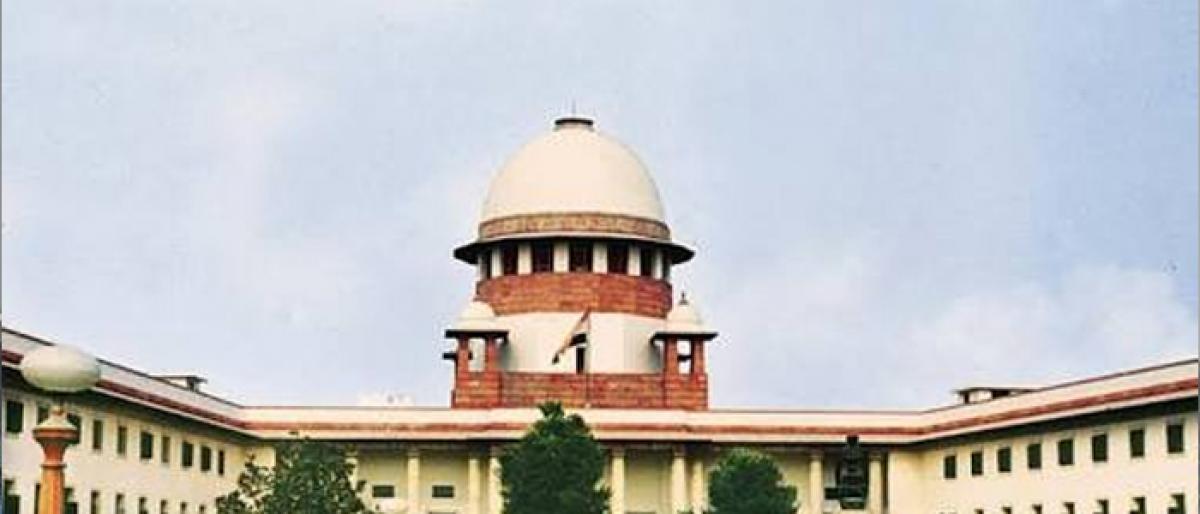Apex Court to examine section 377

The Supreme Court on Thursday said the social stigma and discrimination attached to the LGBTQ community would go if criminality of consensual gay sex is done away with, while maintaining that it would scrutinise the legal validity of section 377 of the IPC in all its aspects
New Delhi: The Supreme Court on Thursday said the social stigma and discrimination attached to the LGBTQ community would go if criminality of consensual gay sex is done away with, while maintaining that it would scrutinise the legal validity of section 377 of the IPC in all its aspects.
A five-judge bench headed by Chief Justice Dipak Misra, hearing a clutch of petitions challenging the constitutional validity of the 158-year-old penal law, also rejected a proposal of lawyers, seeking retention of section 377, that public opinion should be elicited on the matter, saying it did not want a referendum but would go by constitutional morality.
The bench took note of the vehement opposition of these lawyers and their allegation that Centre has taken a “U-turn” in the case. “On the mere concession of the Centre, we will not say that the section is ultra-vires. We will have to analyse every aspect.
We will do a detailed analysis of Section 377 and its constitutional validity,” the bench, which also comprised Justices R F Nariman, A M Khanwilkar, D Y Chandrachud and Indu Malhotra, said. “We will try to see whether section 377 of the IPC can stand the test of fundamental rights enshrined under Articles 14 (right to equality), 19 (freedom of speech and association) and 21 (right to life and liberty) of the Constitution,” the bench said.
It also objected to the submission of lawyer Manoj George that the Centre has made a U-turn on its stand and said that several verdicts including the one on right to privacy have come in the meanwhile and it would not be appropriate to call it a “U-turn”. The court observed that an environment has been created in the Indian society over the years that has led to deep-rooted discrimination against the community which has also adversely impacted their mental health.
The bench asked lawyer Maneka Guruswamy, who was appearing for a petitioner, whether there was any law, rule, regulation, bye-law or guideline which barred or restrained homosexuals from availing any right which are available to others. “There are no such provisions,” she said. The bench then said the LGBTQ (lesbian, gay, bisexual, transgender and queer) community faced the stigma because of the criminality attached to consensual same-sex relationship.
“Once the criminality (under section 377) goes, then everything will go (social stigma, discrimination etc),” it said. “Over the years, we have created an environment in the Indian society which has led to deep-rooted discrimination against people of same sex involved in a consensual relationship and this has impacted their mental health also,” the bench said on the third day of crucial hearing to decide the constitutional validity of Section 377 of the IPC.
Section 377 refers to ‘unnatural offences’ and says whoever voluntarily has carnal intercourse against the order of nature with any man, woman or animal, shall be punished with imprisonment for life, or with imprisonment of either description for a term which may extend to 10 years, and shall also be liable to pay a fine.
Referring to the provision of the Mental Health Care Act, the bench said, “it also recognises the fact that such persons cannot be discriminated against on the ground of sexual orientation”. The observations came when senior advocate C U Singh, appearing for one of the intervenors, said mere striking down of section 377 will not serve the purpose as the LGBTQ community were being discriminated against on various counts.
“This community feels inhibited as they do not even get proper medical care because of the prejudice,” Justice Malhotra said, adding even medical professionals do not maintain confidentiality. The advancing of arguments remained inconclusive and would resume July 17. Yesterday, the government had left it to the apex court to test the constitutional validity of section 377, urging that issues like gay marriages, adoption and ancillary civil rights of LGBTQ should not be dealt by it.
Taking note of the Centre's submission that other issues like gay marriages, adoption and ancillary civil rights of LGBTQ community should not be dealt, the court said it was not considering all these issues. The bench had said it would test the validity of the law in relation to the consensual sexual acts of two adults and if it decides to strike down the penal provision then it would remove “ancillary disqualification” of LGBTQ community members which can join services, contest elections and form associations.
Lawyer Guruswamy had yesterday referred to reports of Indian and American psychiatric bodies and said homosexuality was a normal sexual orientation. Terming the law as a “terrible colonial legacy”, she had said it violated Articles 15 (discrimination on sex), 14 (equality), 19 (liberty) and 21 of the Constitution and has a “chilling effect” on the sexual minority.














